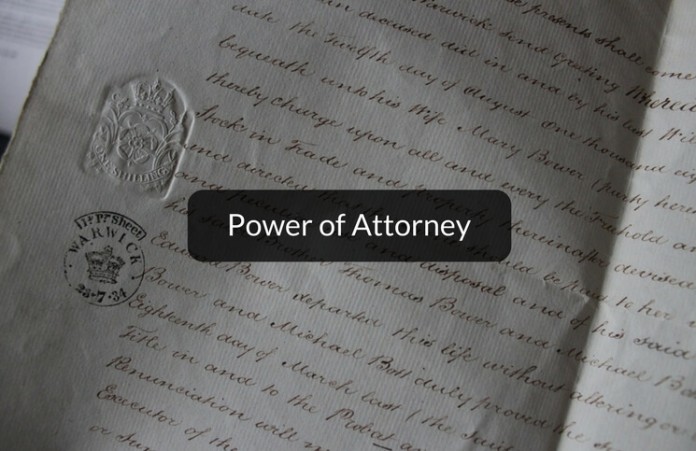Written by Uzair Ahmad Khan, pursuing Diploma in Entrepreneurship Administration and Business Laws offered by Lawsikho as part of his coursework. Uzair is currently a student of B.A.LLB 5th year at Teerthanker Mahaveer University.
INTRODUCTION
A power of attorney is an important legal document giving one person power to act on behalf of another person. The agent can have broad-ranging legal authority or limited authority to make legal decisions about the principal’s property, finances or medical care depending upon the type of power of attorney. The power of attorney is frequently used in the events where the principal can’t be present to sign important legal documents for financial transactions.
The scenario in which the power of attorney signed abroad
Where a person residing outside India wants to buy, purchase, sell or rent out a particular property in India but unable to visit India and attend the sub-registrar office in person to get the documents registered. In that case, the person can execute the power of attorney whereby he can appoint his friend, family member and his lawyer to act as his agent/attorney and get his document registered in the registrar office for the transfer of property and the registration of property.
Types of Power of Attorney Executed
There are different types of Power of Attorney and they are follows as-
General Power of Attorney
It is one of the broadest types of power of attorney that grant absolute power to the agent for handling the affairs on behalf of the principal. This type of power of attorney is less executed by the principal because it grants the absolute power to the agent and there is a chance of abuse of power by the agent.
Special Power of Attorney
It is one of the narrowest types of power of attorney that grant limited power to the agent for handling the affairs on behalf of the principal. This type of power of attorney is more executed by the principal because it grants the limited power to the agent and there is no chance of abuse of power by the agent. It is also known as the limited power of attorney.
Durable Power of Attorney
It is the type of power of attorney which gives power to the agent for handling affairs on behalf of the principal even if the principal becomes mentally incompetent and unable to take any decision. For example, if a person falls in a coma but wants his wife to make a decision on his behalf then he can denote that he wishes to have his wife to be his Durable Power of Attorney.
Health Care or Medical Power of Attorney
A Health Care or Medical Power of Attorney is the type of power of attorney where an agent is authorized by the principal to make decisions on his behalf on matters related to medical treatment. When a person falls ills he has the right to choose the kind of medical treatment he wants to have but when he falls gravely ill and not in a condition to give his consent then, in that case, the agent authorized by him will choose the kind of treatment for his principal.
Ingredient for a valid power of attorney
-Both the person giving and receiving must be competent.
-Minors are not competent to grant power of attorney.
-It should be given for legal purposes.
-The POA must be duly stamped, notarized or adjudicated as per the case.
-Power of Attorney executed abroad and authenticated by an Indian Embassy should be stamped and adjudicated within three months after receipt in India.
Can Power of Attorney Executed Abroad?
Yes, section 14 of Notaries Act, 1952 empowers the central government to declare that the notarial act done by notaries in other countries shall be recognized for specified purposes.
How power of attorney can be executed outside India?
If a person settled outside India and unable to visit India in the near future, he may execute a power of attorney from India through the Indian embassy.
There are two ways to execute a power of attorney from abroad-
Through Legislation
In this case, signatures of the notary or judge before whom the POA is executed are required to be authenticated by the duly authorized representative of the Indian embassy. As per section 3 of the Diplomatic and Consular Officers Act, 1948 notarizing a deed from an authorized officer of the Indian embassy would be considered a valid notary. Such power of attorney is not required to be stamped at the time of execution. However, it needs to be stamped within 3 months from the date of receipt of the POA India.
Apostalisation
It is the process by which deed of POA executed outside India is proven through an apostalisation which is governed by Hague Convention, 1961. The apostille is a certificate which confirms and verifies the signature/seal of the person who verified the document. However, this deed too needs to comply with Indian laws such as the Indian Registration Act, 1908 and Power of Attorney Act, 1882.
How to get Power Of Attorney attested at Indian consulate/embassy?
The procedure is simple and fairly regular at most Indian consulates worldwide. Generally, the steps involved are:
- Power of Attorney executed abroad for the purpose of sending POA to India does not require an Indian stamp paper. A plain piece of paper can be used to write down the POA all terms and conditions. The terms and conditions contain the list of all powers a person want to share with the POA holder. List out whatever a person wants the POA holder to do on his behalf.
- Two copies of the POA document will be required by the consular officer.
- POA document must be signed before the embassy officer at the time of attestation.
- Two witness signatures are required on the POA document.
Documents required for Attestation of POA by Indian Embassy
- POA prepared documents along with copies
- Original passport + copies of all non-blank pages including first and last page.
- Copy of Address proof in the country of your residence. For example A bank statement, driving license, utility bill etc.
- Proof of legal status in the country of residence, such as visa etc.
- Two passport size photographs
- The applicable fee at the time of attestation.
- Witnesses if going to consulate should also take their proof of identity documents. They will be required when they sign POA at the consulate to confirm their identity.
How to revoke power of attorney given in India from abroad?
It depends upon the type of power of attorney is given to the agent. Basically, there are two kinds of power of attorney which can be revocable and they are as-
Revocable Power of Attorney
While a revocable power of attorney can generally be cancelled by publishing notice of revocation in two reputable newspapers and sending the same copy to the Power of Attorney holder.
Irrevocable Power of Attorney
In the case of irrevocable POA, the revocation can only be done by approaching a court in India in the appropriate jurisdiction.
If a POA is not registered, it can be revoked by drafting a revocation document and sending it by registered mail to the person who holds the POA and publishing a public notification in two well-circulated vernacular newspapers in the area where the POA relates to.
Section 85 of Indian Evidence Act, 1872
Section 85 of Indian Evidence Act, 1872 contains presumption as to power of attorney which means that the court shall presume that every document proposed to be a power of attorney and have been executed before must be authenticated by a notary public or any court, judge, magistrate, Indian Consul or Vice-Counsel, or representative of the central government.
Important Case laws
Rajesh Wadhwa v. Dr. Sushma Govil Manu[1]
In this case, Delhi high court after considering various judgments of various courts in and outside India, came to hold that section 14 of Notaries Act, 1952 do not create any impediment in recognizing the notarial acts of such countries, which are not declared as recognized by a notification of the central government.
La Chemise Lacosle v. Crocodile Indl. Ptv. Ltd.[2]
In this case, Delhi high court held that even if there might be no mutuality between India and another country within the meaning of section 14 of the Notaries Act, 1952 functions of notaries in that foreign country could be given legal recognition by courts and authorities in India. The notification mention under section 14 of the Notaries Act, 1952 is not considered as mandatory.
Even the Allahabad high court in Abdul Jabbar case observe that section 85 of Indian Evidence Act applies equally to documents authenticated by Notaries public of other countries and there is no requirement to import the provisions of Notaries act for interpreting the provisions of the evidence act.
Conclusion
As per section 14 of Notaries Act, 1952 the Power of Attorney be executed abroad can be effective in India but it is advisable to everyone whoever is executing it abroad shall take proper care while executing Power of Attorney because it is an important legal document which transfers the decision making power of principal to the agent.
References
- AIR 1989 Delhi 144
- CS (OS) No. 894/2001
Students of Lawsikho courses regularly produce writing assignments and work on practical exercises as a part of their coursework and develop themselves in real-life practical skill.
https://t.me/joinchat/J_0YrBa4IBSHdpuTfQO_sA
Follow us on Instagram and subscribe to our YouTube channel for more amazing legal content.
 Serato DJ Crack 2025Serato DJ PRO Crack
Serato DJ Crack 2025Serato DJ PRO Crack











 Allow notifications
Allow notifications



Thank you for the well written article.When the power of attorney is prepared from abroad and sent to the executing person in India, and it must be signed within 3 months.
But it doesn’t say who will sign it in India ?
Can you please tell me before whom shall the prepared power of attorney be signed?
Good article on Power of Attorney Apostille and Embassy Attestation in India. Thanks!
Write up is informative and good but the example given in “Durable Power of Attorney” is not clear.
“Example : If a person falls in a coma but wants his wife to make a decision on his behalf then he can denote that he wishes to have his wife to be his Durable Power of Attorney.”
If a person is in coma, how can he express his needs and wants?
well written
well written and so logistic, keep it up
very good explanation, very helpful…
Gud nd informative article……